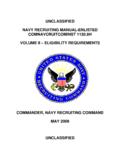Transcription of The Lien for Unpaid Wages Law HB 1130 / SB 758 FREQUENTLY ...
1 1 The Lien for Unpaid Wages Law HB 1130 / SB 758 FREQUENTLY ASKED QUESTIONS What is a lien for Unpaid Wages ? A lien for Unpaid Wages is a method of putting a hold on property of an employer until the employer pays the worker the Wages the worker has earned. Like other liens, a lien for Unpaid Wages would keep the employer from selling, hiding, or disposing of the property until the Wages are paid or the lien is released. How does a lien for Unpaid Wages work? It is a three-step process: 1. Notice. The worker must personally serve the employer with a written notice that describes the Wages that are due and the property that will be subject to a lien for Unpaid Wages . Personal service under Md. Rule 2-121 requires personal delivery or that the recipient sign for registered mail receipt.
2 2. Establishment. The lien for Unpaid Wages is established if the employer does not dispute the lien for Unpaid Wages within 30 days, or if the employer disputes it in court and the court rules that the lien for Unpaid Wages is valid. 3. Recorded. The lien for Unpaid Wages is recorded by filing it in personal property or land records. This keeps the property from being sold or transferred until the lien for Unpaid Wages is paid off. Does an employer have a chance to dispute a lien for Unpaid Wages ? Yes. If the employer disputes whether the Wages have been paid or how much is due, the employer may file a complaint in court and ask the judge to decide. The burden of proof is always on the employee to make the case and prove the Wages weren t Is the employer protected against frivolous or bad faith claims?
3 Yes. The bill provides that the court may award attorney fees and costs to the employer if the court finds that the employee s claim is in bad faith or frivolous. Are there other Maryland lien laws? Yes. Maryland already has 23 lien laws, including liens to protect mechanics, real estate brokers, attorneys, artisans, pilots, hotels, hospitals, veterinarians, warehouseman, condominiums, vendors, farmers, and ground rent owners. Lien laws are well accepted means of making sure that people follow through on their legal commitments to other people. This bill is based on the Maryland Contract Lien Act. 1 In all types of liens, the owner of the property that is the subject of the lien have two rights: the right to be notified of the claim against them, and the right to have a court hearing if they dispute the claim.
4 The lien for Unpaid Wages law provides both rights. The lien for Unpaid Wages law is based on the Maryland Contract Lien Act, Md. Code Ann., Real Prop. 14-201 et seq., which has been upheld as constitutional by the Maryland Court of Appeals in the case of Golden Sands Club Condo Inc. v. Waller, 313 Md. 484 (1988). 2 Why do we need a lien for Unpaid Wages ? We need this tool because too many employers do not pay their workers the full amount they have earned, and it is very difficult for workers to collect these Unpaid Wages . This issue of wage theft is a huge problem both nationally and in the state of Maryland. Nationally, more than 65 percent of low- wage earners are victims of wage theft each week. Moreover, even where an employer clearly has not paid Wages owed, collecting that money is difficult.
5 In Maryland, DLLR was only able to collect Wages owed in less than one-quarter of meritorious cases in 2010, and in FY 2012, employers paid back the Wages due in only 16% of cases where final orders were ultimately issued. Finally, litigation is time-consuming and expensive, so workers need an efficient and cheaper alternative. Why don t employers pay their workers? Companies that practice wage theft have learned that many workers lack the resources or wherewithal to pursue costly litigation or lengthy administrative processes, and that it is relatively easy to hide assets to avoid paying a judgment. In areas where liens have been used, the parties are often able to achieve a speedy resolution once the non-paying entity realizes that its property could be placed on hold by a lien.
6 Does wage theft affect other businesses? Yes, in two ways: Businesses that artificially and illegally keep their business expenses low by not paying the workers have an unfair advantage over businesses that play by the rules and pay workers what is their due. When workers don t get paid, families don t have money to spend. That means they can t pay their bills on time or buy groceries and other items their families need. Do most cases of wage theft end up in court? No. For low- wage workers, the filing fees and time and expense of hiring an attorney often outweigh the amounts owed, so many cases of wage theft never get filed. And, in many cases, there is no real dispute about the amount of Wages earned or the lack of payment. That s why most liens for Unpaid Wages can be resolved without going to court.
7 The reality is that going to court is a last resort. It s expensive and it can delay enforcement significantly. If the employer disputes the lien for Unpaid Wages and loses in court, who should pay court costs and attorney fees? Many consumer protection and other laws already require the losing party to pay the attorney fees. That makes sense here as well. Most low- wage workers cannot afford to hire an attorney, but private attorneys do take these kinds of cases when the amount of Unpaid Wages is very large. So, if an employer chooses to go to court and loses, it is only fair that the employer pays both court costs and attorney fees. This has the added effect of discouraging frivolous or unfounded litigation and reducing taxpayer-financed government enforcement costs by encouraging private attorneys to take wage -theft cases.
8






